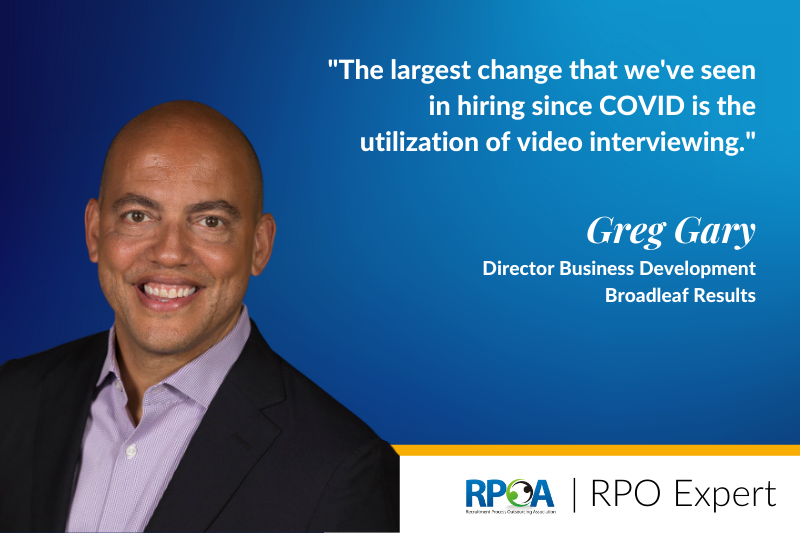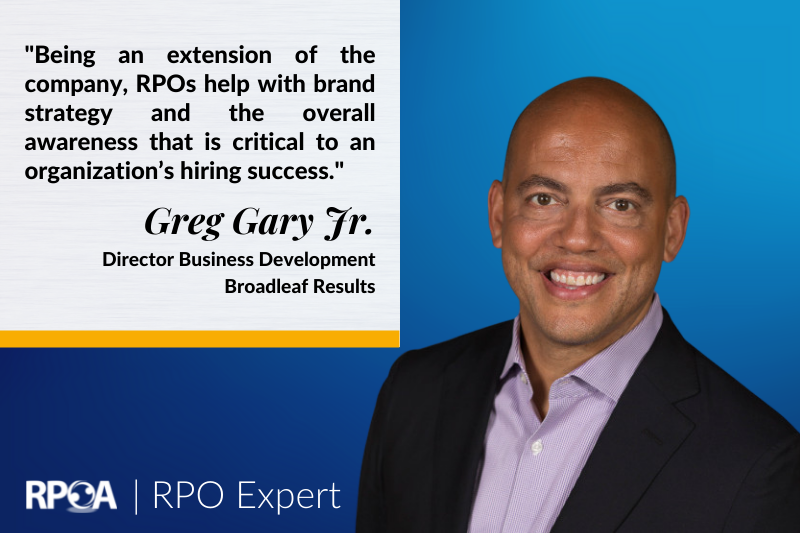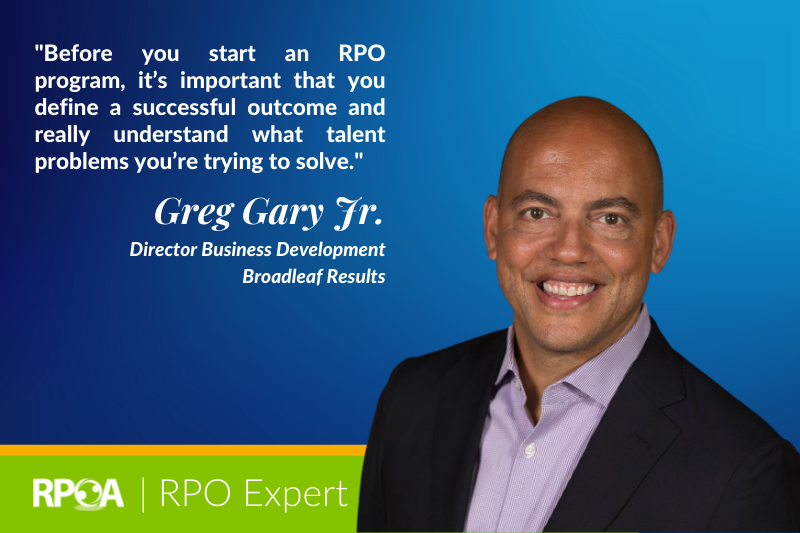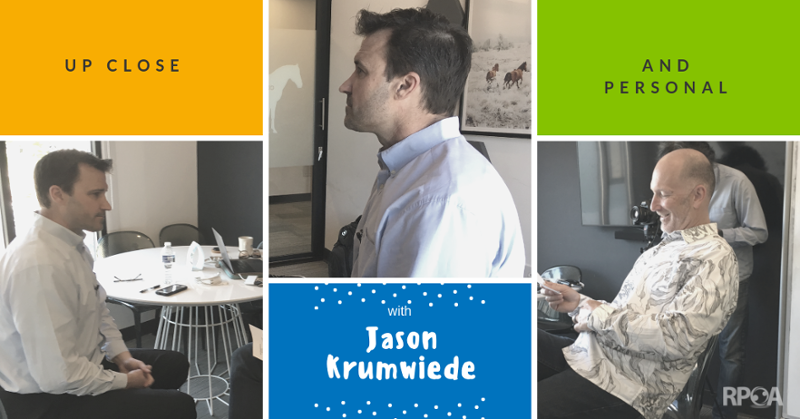
In part one of our interview with Greg Gary, Senior Director of Business Development for Broadleaf Results, we covered fundamental questions about recruitment process outsourcing (RPO). In part two, we talked about the tactics RPO uses to attract and retain talent and the use of tech to improve hiring performance. In the final part of the edited three-part interview for the RPO Expert Series, we focus on the impact of COVID on RPO agreements, recruitment, and the overall workforce.
RPOA: What impact has COVID and the current talent situation had on the need to renegotiate RPO agreements?
Gary: Times have changed. Between the pandemic and the way people are now viewing work, it's different. Trying to find talent is not easy; there is a full-out war for finding talent. It’s changing the metrics that we've utilized in the past.
It's also changed things from a cost perspective. Over the last 12 to 18 months, the need for an RPO has risen to levels we've never seen. And one of those reasons is the difficulty in securing recruiting talent and resources. We've all noticed contract recruiters with one to two years of experience getting $100 an hour to go somewhere else. Well, how do you tell these people not to go? Right? How do you tell them not to go when there's a $100 an hour job that's out there for them. So it's really spending more time showing the importance and benefits of your organization.
But it's also a change for us. We have to renegotiate our RPO contracts because we can't get these people at the same prices that we have in the past—and neither can you.
Suggested webinar on-demand: Navigating RPO
When your needs change you may find yourself in a situation where you want to start thinking about renegotiating your RPO contract. We live in a day and age where mergers and acquisitions are constantly upon us. As those happen, there are different possibilities that arise. One, maybe the merging organization has an incumbent RPO and you have one. There's no need to have two different RPO partners. So how do we get you into one program and figure out who has the best program for your needs, as they've now changed?
Also, you may require a partner with a different level of expertise or coverage than what you've had in the past. Again, as you look at mergers and acquisitions, different types of positions come in, or maybe, your business model has changed. If that's happening, ensure you have a provider that can still do exactly what you need them to do.
What would make you want to look at renegotiating a contract? Maybe the partner that you've chosen is not performing at the level you expect—and your expectations are realistic. If that's the case, maybe it's time to take a look. Maybe they're not the culture fit that you thought they were going to be. Depending on the organization and based on size, there are many factors that come into play in defining what a good experience is and how their culture works. Sometimes one organization isn't as good a match for you as opposed to another.
A great example of this—is we are a family-owned business that started small and has grown over the years. We understand those small to mid-market organizations because we were them at one point in time. Understanding that culture fit is important and if your previous partner wasn't a good fit, you may consider making a move.
And then, last and always—are you getting value for what you're paying? Are you getting the return on the investment?
What has been the impact of the changes in hiring demand on the current workplace?
The scope of impact is industry-specific. When you get into organizations that utilize a lot of niche players, there's as much of a war for talent as there's ever been. You get into engineering companies that have a strong engineering presence, and hiring is still a mammoth challenge for them. I would say in some of the manufacturing areas, we've seen it get a little better in recent months. But even if they are dealing with high turnover that's always been a challenge.
The other part is we're in year two and a half of this experience. Now organizations have gotten smarter about attracting their talent. They've changed some of the job requirements. Now organizations are saying, 'I'm willing to take the college kids and train them up. I don't need a person with three to five years of experience. I've got a training program that we've now built over the last year to help get you up to speed.'
The biggest change has been that organizations are getting more creative in how they find their talent than they have in the past. And that's helping to ease, not take away, but ease some of the pain of the talent shortage that we're dealing with.
What recruiting practices do you see staying post-COVID?
Remote work, or a hybrid work—hands down. That's number one. You've seen that shift from employer knows best, or an employer-centric world, to an employee-centric world. And now people are having to be more concerned about, ‘hey, are we going to allow these people to work remotely or in a hybrid schedule?’ And we've seen that impact the old-school companies that have had great brand recognition up until now. They've always been able to say, ‘Hey, I'm XYZ company. You're going to come here,’ but that's not the case anymore. So even those companies have had to change a little on that format of thinking.
Some other pieces are virtual career fairs. Career fairs have been a big part of a community. Now they've almost all become virtual and this has been great in two ways. Number one, you're able to reach out to the masses. You no longer have to do a career fair in just Washington, DC. You can do a nationwide, virtual career fair. And if you have remote work, that's going to work even better for you. We've seen that pick up in a big way.
And probably the largest change that we've seen for everyone is the utilization of video interviewing. If you don't have Zoom, Teams, or some sort of video conferencing, you're now a dinosaur, right? It's a way of life. We've seen organizations start to allow video interviews. And then they're handling final decisions or decision-making without an in-person interview. COVID has driven the change to video interviewing.
What companies have you seen figure out a successful hybrid work model?
I'll use our organization as an example. When you think of your traditional recruiting models, it's important that everybody be there together, so we can all feed off of each other's energy and hear what each other is thinking. And it's the best form of training. That's the way our industry started and blew up to what it is today.
However, times have changed and our organization realizes that. We've switched to a hybrid model, where you're working in the office for three days, remotely for two days. And you're working with the company to make sure that there's still coverage all the time in the office.
We sat down and talked about how we would like to keep our schedule and then started to put that into play. And it's worked successfully, very successfully. It's been great for us. We haven't lost any business continuity. We've seen our numbers continue to rise and have big importance. We noticed we can retain our resources, retain our recruiters, and recruit and retain our people because we've given enough of a change that it's exciting for everyone. And it also has shown our company growing with the times, which I think has impacted our retention in a very positive way. We've continued to grow over time as well.
It's that flexibility, isn't it?
Yeah. One size does not fit all. So you have to have that agility, you have to have that flexibility to ensure you're properly impacting every client, whatever way they need to be impacted. And that's another important thing for all of our all potential partners out there. One size does not fit all and if someone's telling you that, well, that's probably not the right organization for you.
Related Content: Broadleaf's Greg Gary talks attracting/retaining talent and tech














